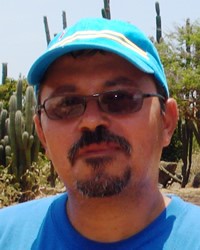Antillean Creole, Papiamentu in Aruba

Photo Source:
A. Robles de Medina
|
Send Joshua Project a map of this people group.
|
| People Name: | Antillean Creole, Papiamentu |
| Country: | Aruba |
| 10/40 Window: | No |
| Population: | 86,000 |
| World Population: | 309,000 |
| Primary Language: | Papiamentu |
| Primary Religion: | Christianity |
| Christian Adherents: | 98.70 % |
| Evangelicals: | 9.93 % |
| Scripture: | Complete Bible |
| Ministry Resources: | Yes |
| Jesus Film: | Yes |
| Audio Recordings: | Yes |
| People Cluster: | Afro-Caribbean, Dutch |
| Affinity Bloc: | Latin-Caribbean Americans |
| Progress Level: |
|
Introduction / History
Fragments and cave paintings found on the island are widely considered remnants of the island's earliest inhabitants, the Arawak Caquetios Indians from South America, and date as far back as 1000 A.D. The Europeans arrived in 1499, when Spanish explorers found the island. The Spanish then controlled Aruba until the Dutch took over in 1636 and made the island, along with its neighbors Bonaire and Curacao, part of the Netherlands Antilles. Since then, with the exception of a brief period of English possession in 1805, Aruba has remained under Dutch control. (1)
Early on, Aruba became a ranch economy with horse and cattle production supporting crops of mango, millet, coconut, and aloe. In 1824, the discovery of gold set off a short-lived gold rush, which was soon exhausted and later followed by the rise of the Aruban aloe industry. In the 1920s, Standard Oil built a refinery near the town of San Nicolas and became the island's largest employer. This new industry attracted an influx of immigrants from North America, Europe and the rest of the Caribbean, creating a diverse cultural mix. Soon, English was widely spoken, and it remains so today, although Aruba's official languages are Dutch and Papiamento. (1)
Papiamento, the local Afro-Portuguese Creole language, is only spoken in Aruba, Bonaire, and Curacao, and dates back some 300 years. Papiamento began as a simple pidgin language and evolved upon an African linguistic structure with a vocabulary made up mostly of variations on Portuguese, Spanish, and Dutch words. (1)
What Are Their Lives Like?
Although the first cruise ship arrived in Aruba in 1957, the tourism industry began to develop in earnest at the end of the 20th century and is now the island's primary economy. Today, approximately 100,000 people live on Aruba, an island roughly the size of Washington, DC. The official currency is the Aruban gilder, but US dollars are widely accepted. (1)
Through local foods, architecture, celebrations, and languages one can immediately see the different influences the past settlers had on the island. Today, the Dutch have the most influence upon Aruban society. The Dutch language is the official tongue of the Aruban people and Dutch law is practiced there. Aruba continues to have close ties to the Netherlands.
Aruba began competing in the Summer Olympic Games in 1988. Soccer is popular there also. The arts and music are represented in Aruba and have been doubtlessly influenced by the number and frequency of travelers to the island. The Aruban economy is largely dependent upon tourism and tourism related activities.
What Are Their Beliefs?
Many Arubans whose origins began in Africa and others, who have taken these practices upon themselves from their influence, are involved in numerous religious traditions. Plethoras of rituals are practiced in many aspects of their lives. Some of the rituals are rooted in occult beliefs but others are not clearly linked to a religion.
Fortune telling and gambling are extremely popular in the daily lives of indigenous Arubans. Many rituals govern the 'proper' practice of these vices.
Christianity is practiced in Aruba along with many other religions including Islam, Buddhism, Hinduism, Judaism, and traditional religions.
What Are Their Needs?
Like any nation, Aruba needs clear, accurate, and consistent presentation of the Bible for evangelism and instruction. Combating the depth and concentration of ritualism and folk beliefs in the local culture will be an on-going struggle for any group seeking the spread God's good news.
Prayer Points
Pray that God will be active in revealing Himself to the Aruban people as well as throughout the world.
Pray that workers will be sent to this field of opportunity.